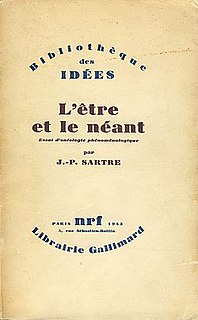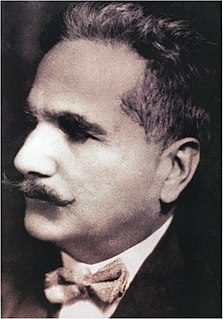This article is being considered for deletion in accordance with Wikipedia's deletion policy. Please share your thoughts on the matter at this article's deletion discussion page. |
Reflections of Humanity is one of Ali Shariati's important lectures, which concerns the role of culture in human life. It defines culture and barbarism and how it is discussed in the light of the Islamic doctrine. He defines Modernity and its role in the vital issues confronting Western and, more importantly, Islamic nations. He argues that modernity has been imposed on non-European nations in the guise of civilization by the west and that they have persisted in calling it "ideal". He begins by defining certain terms:
Repentance is reviewing one's actions and feeling contrition or regret for past wrongs, which is accompanied by commitment to and actual actions that show and prove a change for the better.

Ali Shariati Mazinani was an Iranian revolutionary and sociologist who focused on the sociology of religion. He is held as one of the most influential Iranian intellectuals of the 20th century and has been called the "ideologue of the Iranian Revolution", although his ideas did not end up forming the basis of the Islamic Republic.
Expectations from the Muslim Woman, also called Our Expectations of the Muslim Woman, is regarded as one of Ali Shariati's most important lectures referring to women's rights in Islam.

Being and Nothingness: An Essay on Phenomenological Ontology, sometimes published with the subtitle A Phenomenological Essay on Ontology, is a 1943 book by the philosopher Jean-Paul Sartre. In the book, Sartre develops a philosophical account in support of his existentialism, dealing with topics such as consciousness, perception, social philosophy, self-deception, the existence of "nothingness", psychoanalysis, and the question of free will.
Liberalism and progressivism within Islam involve professed Muslims who have created a considerable body of progressive thought about Islamic understanding and practice. Their work is sometimes characterized as "progressive Islam". Some scholars, such as Omid Safi, differentiate between "Progressive Muslims" and "Liberal advocates of Islam".

Seyyed Jalāl Āl-e-Ahmad was a prominent Iranian novelist, short-story writer, translator, philosopher, socio-political critic, sociologist, as well as an anthropologist who was "one of the earliest and most prominent of contemporary Iranian ethnographers". He popularized the term gharbzadegi – variously translated in English as "westernstruck", "westoxification", and "Occidentosis" –, producing a holistic ideological critique of the West "which combined strong themes of Frantz Fanon and Marx".
Contemporary Islamic philosophy revives some of the trends of medieval Islamic philosophy, notably the tension between Mutazilite and Asharite views of ethics in science and law, and the duty of Muslims and role of Islam in the sociology of knowledge and in forming ethical codes and legal codes, especially the fiqh and rules of jihad. See list of Islamic terms in Arabic for a glossary of key terms used in Islam.

Murāqabah is an Islamic methodology, whose aim is a transcendental union with God. Through murāqabah, a person watches over their heart and soul, to gain insight into one's relation with their creator and their surroundings. Murāqabah is a tradition commonly found in ṭarīqas. The objective of murāqabah is to purge one's base characters and develop lofty character in its place. Comparisons have been drawn to meditation, theosis, and henosis. According to tradition, it is said to have been the practice of Muhammad during his stay in the Cave of Hira before he met Jibreel.
Intellectual movements in Iran involve the Iranian experience of modernity and its associated art, science, literature, poetry, and political structures that have been changing since the 19th century.

Abul Hasan Ali Hasani Nadwi was a leading Islamic scholar, thinker, writer, preacher, reformer and a Muslim public intellectual of 20th century India and the author of numerous books on history, biography, contemporary Islam, and the Muslim community in India, one of the most prominent figure of Deoband School. His teachings covered the entire spectrum of the collective existence of the Muslim Indians as a living community in the national and international context. Due to his command over Arabic, in writings and speeches, he had a wide area of influence extending far beyond the Sub-continent, particularly in the Arab World. During 1950s and 1960s he stringently attacked Arab nationalism and pan-Arabism as a new jahiliyyah and promoted pan-Islamism. He began his academic career in 1934 as a teacher in Nadwatul Ulama, later in 1961; he became Chancellor of Nadwa and in 1985, he was appointed as Chairman of Oxford Centre for Islamic Studies.
Religious intellectualism in Iran reached its apogee during the Persian Constitutional Revolution (1906–11). The process involved philosophers, sociologists, political scientists and cultural theorists.
Gharbzadegi is a pejorative Persian term variously translated as ‘Westernized’, ‘West-struck-ness’, ‘Westoxification’, ‘Westitis’, ‘Euromania’, or ‘Occidentosis’. It is used to refer to the loss of Iranian cultural identity through the adoption and imitation of Western models and Western criteria in education, the arts, and culture; through the transformation of Iran into a passive market for Western goods and a pawn in Western geopolitics.
Postcolonialism is the critical academic study of the cultural, political and economic legacy of colonialism and imperialism, focusing on the impact of human control and exploitation of colonized people and their lands. More specifically, it is a critical theory analysis of the history, culture, literature, and discourse of imperial power.

Sir Muhammad Iqbal, was a South Asian Muslim writer, philosopher, and politician, whose poetry in the Urdu language is considered among the greatest of the twentieth century, and whose vision of a cultural and political ideal for the Muslims of British-ruled India was to animate the impulse for Pakistan. He is commonly referred to by the honorific Allama.

The Iranian Enlightenment, sometimes called the first generation of intellectual movements in Iran, brought new ideas into traditional Iranian society from the mid-nineteenth to the early twentieth century. During the rule of the Qajar dynasty, and especially after the defeat of Iran in its war with the Russian Empire, cultural exchanges led to the formation of new ideas among the educated class of Iran. This military defeat also encouraged the Qajar commanders to overcome Iran's backwardness. The establishment of Dar ul-Fonun, the first modern university in Iran and the arrival of foreign professors, caused the thoughts of European thinkers to enter Iran, followed by the first signs of enlightenment and intellectual movements in Iran.

The Madani–Iqbal debate was a debate between leaders of 20th century colonial India, Hussain Ahmed Madani and Muhammad Iqbal, on the question of nationalism in the late 1930s. Madani’s position throughout the debate was to insist on the Islamic legitimacy of embracing a culturally plural, secular democracy as the best and the only realistic future for India’s Muslims whereas Iqbal insisted on a religiously defined, homogeneous Muslim society. Madani and Iqbal both appreciated this point and they never advocated the creation of an absolute ‘Islamic State’. They differed only in their first step. According to Madani, the first step was the freedom of India for which composite nationalism was necessary. According to Iqbal, the first step was the creation of a community of Muslims in the Muslim-majority land.
Shariatism is a body of ideas that describes the inspiration, vision, and the life work of Ali Shariati.
Iranian-Islamic nationalism is a type of religious nationalism which mixes Iranian nationalism with Islamism.

Muhammad Iqbal was a prolific writer who authored many works covering various fields and genres such as poetry, philosophy and mysticism. He expressed his ideas in many forms and this article deals with his educational philosophy. His philosophy has tremendous significance not only for Pakistan educational system, but also for the entire world. His basic concept of education is based on the teaching of the Quran. To him the superior, reliable and faultless source of knowledge is only this one. His whole educational thought is based and revolves on his concept of Khudi. He had a unique concept of education that carries the vital significance being the contribution of both modern and ancient thoughts. His well balanced thoughts are based upon the strong roots of Islamic teachings on one side and being progressive and coping with the modern scientific age on the other side. He has been very categorical in expressing his views about the education, its nature, and philosophy in his poetical works, articles and speeches. He also wrote various letters to different people and discussed the educational phenomenon in detail.

Muhammad Iqbal was a prolific writer who authored many works covering various fields and genres such as poetry, philosophy and mysticism. His philosophical writings and poetical works had a notable impression on the religio-cultural and social revival of the East particularly subcontinent Muslim. The central theme of his philosophical thought throughout his works, prose and poetry, especially in The Secrets of the Self,The Secrets of Selflessness and Message from the East is the Doctrine of Khudi. As a Muslim sage he realized that the revival of man both as an individual and as a member of social group can only come from the ultimate central principle of his being, namely, the Self or Khudi. His knowledge convinced him that the decadent condition of Muslims was due to those philosophical systems which regard the world as a mere illusion not worth striving for, and to certain classes of Sufis who regarded self-annihilation as the highest goal of human life. He use of term Khudi is synonymous with the world of Ruh as mentioned in the Quran. To him the main purpose of the Quran is to awaken in man "the higher consciousness of his manifold relations with Allah and the universe". In his opinion the undeveloped condition and the miserable plight of the Muslim nations were due to lost real identity of Khudi and to keep distance from the true spirit of Islam. Iqbal's ideal for individual as well as social life is Self-affirmation not Self-negation which was the common teaching of Hindu intellectualism and Sufi pantheism. Hence Iqbal tried to establish a firm theoretical foundation for his viewpoints, and to discover a proper philosophical terminology for conveying his message to all the humanity. To Iqbal Khudi is a universal and comprehensive reality with different degress in expression, which moves perfection. Various factors and principles-which are mostly the same positive and negative religio-moral qualities can strengthen or weaken Khudi in human beings until it reaches the highest stage of perfection, that is, Vicegerency of God on earth. Iqbal, therefore, condemned the doctrine of dissolution of the human self into the featureless Absolute as an Ideal of inaction and poverty of life, and developed his own doctrine based on self-affirmation under the unique name of Khudi. According to him: